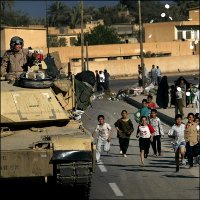Registration
You will receive an email confirming your registration.
IMGXYZ1248IMGZYXAs the United States withdraws from Iraq and the Iraqi government works to regain full sovereignty, many questions remain about the country’s stability, the success of its political and economic transformation, and its potential to emerge as a significant regional player in the near future.
Iraq has the potential to become a pivotal actor in the fast-changing Gulf region. It has the capacity to balance other regional powers like Iran, and its crucial geo-strategic position in the wider Middle East makes it a valuable political and economic partner for both the United States and Europe. And yet, it is still unclear whether Iraq will be able to fully realise its potential, particularly in the short term.
For the United States and Europe, the future of Iraq, especially its imminent leading role in the security architecture of the Gulf, is crucial. Deliberation on the long-term relations between Iraq and the U.S. and Europe is needed.
Programme
Session 1: Domestic Iraq - Political, Economic and Security Perspectives
Chair: Gilles Kepel (Professor and Chair, Middle-East and Mediterranean Studies, Sciences-Po Paris)
Speakers: Saifaldin Abdul-Rahman (Advisor to Tariq Al-Hashimi, Vice President of Iraq); Henri Barkey (Non-Resident Senior Associate, Carnegie Endowment for International Peace); Joseph P. Saba (Country Director Iran, Iraq, Syria, Lebanon, World Bank).
Session 2: Iraq and its Neighbours - Regional Cooperation or Competition?
Chair: Bassma Kodmani (Executive Director, Arab Reform Initiative)
Speakers: Meliha Altunisik (Chair, Department of International Relations, Middle East Technical University); Peter Harling (Iraq, Syria and Lebanon Project Director, International Crisis Group); Shahram Chubin (Non Resident Senior Associate, Carnegie Endowment for International Peace); Ahmed Al-Shikaki (Researcher, CERMAM).
Session 3: Iraq - U.S. Relations after the June 30th Deadline
Chair: Jean-Pierre Filiu (Associate Professor, Middle-East and Mediterranean Studies, Sciences-Po Paris)
Speakers: Ryan C. Crocker (Former U.S. Ambassador to Iraq); Christopher Dickey (Paris Bureau Chief and Middle East Regional Editor, Newsweek International); Marina Ottaway (Director, Middle East Program, Carnegie Endowment for International Peace)
Session 4: Iraq and Europe - Defining New Methods of Engagement and Long-Term Interests
Chair: Fabrice Pothier (Director, Carnegie Europe)
Speakers: Jean Francois-Poncet (Senator and Vice President of the Committee on Foreign Affairs, Defence and Army, French Senate); Romaric Roignan (Vice President, International Relations, Total); Klemens Semtner (Head of Iraq Unit, Federal Foreign Office, Berlin)
Commentator: Vladimir Janecek (External Relations DG, Iran, Iraq, GCC and Yemen Unit, European Commission)
